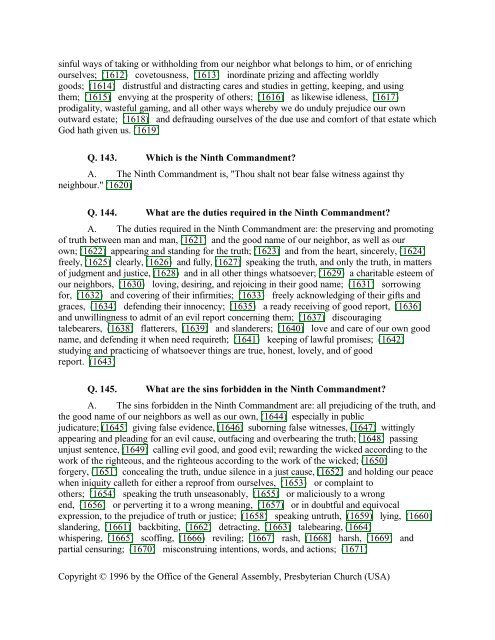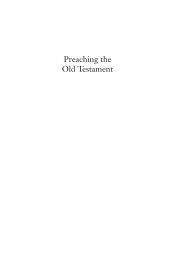The Book of Confessions - The Presbyterian Leader
The Book of Confessions - The Presbyterian Leader
The Book of Confessions - The Presbyterian Leader
Create successful ePaper yourself
Turn your PDF publications into a flip-book with our unique Google optimized e-Paper software.
sinful ways <strong>of</strong> taking or withholding from our neighbor what belongs to him, or <strong>of</strong> enriching<br />
ourselves; (1612) covetousness, (1613) inordinate prizing and affecting worldly<br />
goods; (1614) distrustful and distracting cares and studies in getting, keeping, and using<br />
them; (1615) envying at the prosperity <strong>of</strong> others; (1616) as likewise idleness, (1617)<br />
prodigality, wasteful gaming, and all other ways whereby we do unduly prejudice our own<br />
outward estate; (1618) and defrauding ourselves <strong>of</strong> the due use and comfort <strong>of</strong> that estate which<br />
God hath given us. (1619)<br />
Q. 143. Which is the Ninth Commandment?<br />
A. <strong>The</strong> Ninth Commandment is, "Thou shalt not bear false witness against thy<br />
neighbour." (1620)<br />
Q. 144. What are the duties required in the Ninth Commandment?<br />
A. <strong>The</strong> duties required in the Ninth Commandment are: the preserving and promoting<br />
<strong>of</strong> truth between man and man, (1621) and the good name <strong>of</strong> our neighbor, as well as our<br />
own; (1622) appearing and standing for the truth; (1623) and from the heart, sincerely, (1624)<br />
freely, (1625) clearly, (1626) and fully, (1627) speaking the truth, and only the truth, in matters<br />
<strong>of</strong> judgment and justice, (1628) and in all other things whatsoever; (1629) a charitable esteem <strong>of</strong><br />
our neighbors, (1630) loving, desiring, and rejoicing in their good name; (1631) sorrowing<br />
for, (1632) and covering <strong>of</strong> their infirmities; (1633) freely acknowledging <strong>of</strong> their gifts and<br />
graces, (1634) defending their innocency; (1635) a ready receiving <strong>of</strong> good report, (1636)<br />
and unwillingness to admit <strong>of</strong> an evil report concerning them; (1637) discouraging<br />
talebearers, (1638) flatterers, (1639) and slanderers; (1640) love and care <strong>of</strong> our own good<br />
name, and defending it when need requireth; (1641) keeping <strong>of</strong> lawful promises; (1642)<br />
studying and practicing <strong>of</strong> whatsoever things are true, honest, lovely, and <strong>of</strong> good<br />
report. (1643)<br />
Q. 145. What are the sins forbidden in the Ninth Commandment?<br />
A. <strong>The</strong> sins forbidden in the Ninth Commandment are: all prejudicing <strong>of</strong> the truth, and<br />
the good name <strong>of</strong> our neighbors as well as our own, (1644) especially in public<br />
judicature; (1645) giving false evidence, (1646) suborning false witnesses, (1647) wittingly<br />
appearing and pleading for an evil cause, outfacing and overbearing the truth; (1648) passing<br />
unjust sentence, (1649) calling evil good, and good evil; rewarding the wicked according to the<br />
work <strong>of</strong> the righteous, and the righteous according to the work <strong>of</strong> the wicked; (1650)<br />
forgery, (1651) concealing the truth, undue silence in a just cause, (1652) and holding our peace<br />
when iniquity calleth for either a repro<strong>of</strong> from ourselves, (1653) or complaint to<br />
others; (1654) speaking the truth unseasonably, (1655) or maliciously to a wrong<br />
end, (1656) or perverting it to a wrong meaning, (1657) or in doubtful and equivocal<br />
expression, to the prejudice <strong>of</strong> truth or justice; (1658) speaking untruth, (1659) lying, (1660)<br />
slandering, (1661) backbiting, (1662) detracting, (1663) talebearing, (1664)<br />
whispering, (1665) sc<strong>of</strong>fing, (1666) reviling; (1667) rash, (1668) harsh, (1669) and<br />
partial censuring; (1670) misconstruing intentions, words, and actions; (1671)<br />
Copyright © 1996 by the Office <strong>of</strong> the General Assembly, <strong>Presbyterian</strong> Church (USA)




